

M32F4DISCOVERY. M32F407VG. The STM32F405xx and STM32F407xx family is based on the high-performance ARM®Cortex™-M4 32-bit RISC core operating at a frequency of up to 168 MHz.
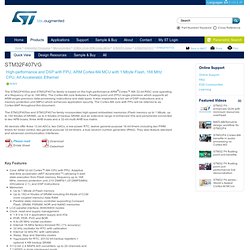
The Cortex-M4 core features a Floating point unit (FPU) single precision which supports all ARM single-precision data-processing instructions and data types. It also implements a full set of DSP instructions and a memory protection unit (MPU) which enhances application security. The Cortex-M4 core with FPU will be referred to as Cortex-M4F throughout this document. The STM32F405xx and STM32F407xx family incorporates high-speed embedded memories (Flash memory up to 1 Mbyte, up to 192 Kbytes of SRAM), up to 4 Kbytes of backup SRAM, and an extensive range of enhanced I/Os and peripherals connected to two APB buses, three AHB buses and a 32-bit multi-AHB bus matrix.
Download Datasheet. STM32F4 Discovery Review. Created on: 24 August 2012 The STM32F4-Discovery evaluation board from ST Microelectronics is a low cost board for evaluating the STM32F4 range of 32-bit ARM Cortex-M4 microcontrollers.
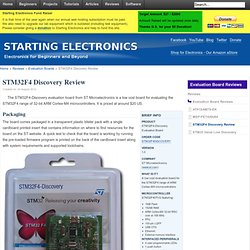
It is priced at around $20 US. Brief Info Product STM32F4-Discovery Evaluation Board Order code Version Company ST Microelectronics (www.st.com) What is it? A low cost evaluation board for the STM32F4 range of ARM Cortex-M4 microcontrollers Microcontroller STM32F407VG featuring: Farnell - STM32F4 DISCOVERY. Watterott - STM32F4 DISCOVERY. STM's Discovery Board mit dem STM32F407VGT6 ARM Cortex-M4F Controller.
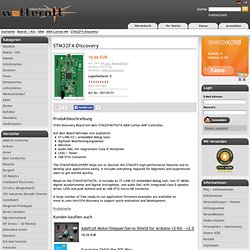
Auf dem Board befinden sich zusätzlich: ST-LINK/V2 ( embedded debug tool)digitaler BeschleunigungssensorMikrofonAudio DAC mit inegriertem Class D VerstärkerLEDs / TasterUSB OTG ConnectorThe STM32F4DISCOVERY helps you to discover the STM32F4 high-performance features and to develop your applications easily. It includes everything required for beginners and experienced users to get started quickly. Based on the STM32F407VGT6, it includes an ST-LINK/V2 embedded debug tool, two ST MEMS, digital accelerometer and digital microphone, one audio DAC with integrated class D speaker driver, LEDs and push buttons and an USB OTG micro-AB connector. A large number of free ready-to-run application firmware examples are available on www.st.com/stm32f4-discovery to support quick evaluation and development. Free and Open ARM Cortex MCU Embedded Development Tools. YAGARTO - Yet another GNU ARM toolchain. CooCox CoIDE mit STM32F4-Discovery Board.
STM32F4 DISCOVERY : Compile the demos with CooCox IDE and Code Sourcery. Installation de l’environnement : Eric ayant déjà fait une introduction de la carte STM32F4 Discovery, je vais donc rentrer dans le vif du sujet directement.
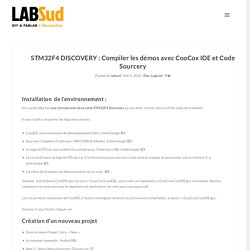
Il vous faudra récupérer les logiciels suivants : CooIDE, environnement de développement libre, à télécharger ICISourcery Codebench Lite pour ARM EABI de Mentor, à télécharger ICILe logiciel STLink, qui contient les pilotes pour l’interface USB, à télécharger ICILe correctif pour le logiciel STLink, car il ne fonctionne pas avec les cartes dont le masque de processeur est en révision Z, à télécharger ICIL’archive du firmware de démonstration de la carte : ICI Installer tout d’abord CooIDE (qui sera en c:\CooCox\CooIDE), puis créer un répertoire c:\CooCox\CooIDE\gcc et installer Sourery codebench en précisant que le répertoire de destination est celui que vous avez créé.
Lors du premier lancement de CooIDE, il faudra renseigner l’endroit ou se trouve le compilateur, à savoir c:\CooCox\CooIDE\gcc. Ensuite, il vous faudra cliquer sur. Technology- Thermal MEMS Accelerometers. MEMSIC's Thermal MEMS Accelerometers are used in millions of new automobiles, phones, cameras, projectors, appliances, and a variety of other applications annually.
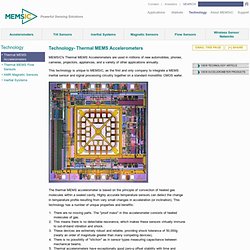
This technology is unique to MEMSIC, as the first and only company to integrate a MEMS inertial sensor and signal processing circuitry together on a standard monolithic CMOS wafer. The thermal MEMS accelerometer is based on the principle of convection of heated gas molecules within a sealed cavity. Highly accurate temperature sensors can detect the change in temperature profile resulting from very small changes in acceleration (or inclination).